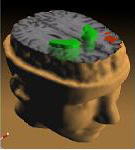Dual Diagnosis: Definition
 In the addiction treatment field, the definition of a dual diagnosis patient is someone who suffers a mental or psychological illness along with their addiction. Both the addiction and the mental illness are strong enough that they could be diagnosed separately. It’s the combination that puts the ‘dual’ in dual diagnosis.
In the addiction treatment field, the definition of a dual diagnosis patient is someone who suffers a mental or psychological illness along with their addiction. Both the addiction and the mental illness are strong enough that they could be diagnosed separately. It’s the combination that puts the ‘dual’ in dual diagnosis.
The distinction between a ‘regular’ addict and a dual diagnosis patient is important because mental illness and drug abuse feed off one another. In many cases, it’s impossible to tell which came first, or even if one is causing the other. For example, a person may seek out cocaine or other stimulants to self-treat depression. But depression is also common with cocaine withdrawal. Marijuana is known to exacerbate schizophrenia and obsessive compulsive disorders are themselves almost indistinguishable from addiction. All of this makes for real challenges when a patient seeks treatment.
Modern understandings about drug and alcohol addiction take into account the physical changes that happen in the brain. These include both neurochemical changes and alterations in structure. The same mechanisms and pathways are part of mental illness as well. Whether the drug abuse led to the mental illness or the other way around, the victim appears with both problems at the same time. A patient with clinical depression who maintains their mood with cocaine isn’t going to respond in the same way to traditional anti-depressants. The cocaine has altered their brain chemistry adversely. The question for therapists is how best to treat these interrelated and interacting conditions. Sometimes, the mental illness is concealed and only emerges after detox for the drug addiction. All of these are complicating factors.
One final complexity is that some mental problems are noted for their link to certain addictions. The standard example is that 70% of schizophrenics smoke cigarettes. We don’t think cigarettes cause schizophrenia, but having a mental illness may draw someone to a particular form of addiction. Some addictions tend to manifest only during an active cycle of illness. A classic example would be gambling and the manic phase of a bipolar patient.